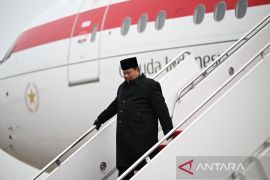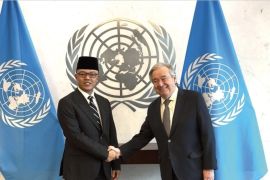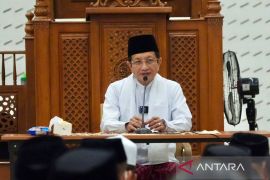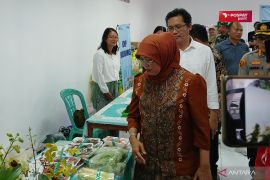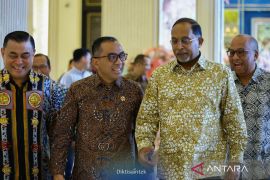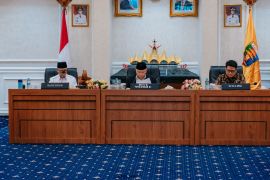There are at least three factors blamed for the government failure to achieve its economic target last year, namely global economic crisis, high fuel imports and low government expenditure.Jakarta (Antara News) - The government has set an economic growth target for 2012 at a range of between 6.3 percent and 6.5 percent but in reality it is only able to reach 6.23 percent.
There are at least three factors blamed for the government failure to achieve its economic target last year, namely global economic crisis, high fuel imports and low government expenditure.
According to the Central Bureau of Statistics (BPS), the Indonesian economy grew by 6.23 percent last year, falling short of the targeted 6.3-6.5 percent due to global economic crisis.
The global economic meltdown weakened the purchasing power of Indonesia`s traditional export markets. This can be seen in the country`s trade deficit.
"The trade balance is affected by external factors. If the factors are disturbed, our exports will be affected," Head of the BPS Suryamin said.
Deputy Trade Minister Bayu Krisnamurthi acknowledged that exports in 2012 had weakened causing the trade balance to leave a deficit. "The economic growth in 2012 grew only at 6.23 percent because the country`s exports were weakening," he said.
BPS data showed that Indonesia`s exports dropped 6.61 percent to US$190.04 billion in 2012 from US$203.5 billion in the year before. Its imports meanwhile rose 8.02 percent to US$191.57 billion from US$177.44 billion.
Bayu said that actually Indonesia`s non oil exports balance was surplus by Rp40 trillion, yet its oil and gas imports jumped up to Rp50 trillion.
Chief Economic Minister Hatta Rajasa said that oil fuel imports put a brake on Indonesia`s economic growth in 2012. The failure to achieve the target of 6.5 percent last year was partly caused by large imports of oil fuel, Hatta said.
Increase in imports including oil fuel imports in 2012 and export contraction had resulted in trade deficit.
Indonesia suffered a trade deficit of US$1.33 billion in 2012, the first in many years, caused by shrinking exports with imports surging. BPS said the country`s exports shrank 4.6 percent and imports rose 9.92 percent in 2012.
Besides low exports and high imports, the other factor blamed for the government failure to achieve its economic growth target is the government`s low absorption of capital expenditure funds.
Finance Minister Agus Martowardojo said that the national economic growth in 2012 could only reach 6.23 percent because the realization of the government`s capital expenditure was low.
"If the realization of government expenditure was the same as that in the previous year, I think the 6.3 percent target could be achieved," the minister said on Thursday.
He said that the realization of the government`s capital expenditure in 2011 which reached 83.6 percent was better than the realization of the same expenditure in 2012 which was only 79.6 percent.
The minister said that the government`s capital expenditure for 2012, which reached Rp140.2 trillion, was bigger than the one allocated in 2011.
"We are concerned because our absorption of capital expenditure funds only reached 79 percent," he asserted.
BPS chief Suryamin said that the government should have increased its spending on consumption which slightly grew by 1.25% in 2012. "Government consumption expenditure is low due to efficient use of goods and moratorium on the recruitment of civil servants, so that the growth rate decreases," Suryamin explained.
But the 6.23 percent economic growth was relatively high compared with those of other advanced and developing nations, he added.
According to Suhariyanto, statistics deputy chief for trade balance and analysis of BPS, Indonesia`s economic growth at 6.23 percent was one of the highest in the world after that of China, even if it failed to meet the government`s target.
"It is true that we failed to achieve the target but amid global economic crisis at present, Indonesia`s economic growth is the second biggest after China`s," he said
Minister Agus said now was a good time for the government to conduct review and to utilize the present good economic growth to narrow the social economic gap among the country`s citizens.
"The 6.23 percent become an input for the government to conduct a review and to further boost and optimize inclusive economic growth," the finance minister said.
In anticipation of trade deficit, BPS chief Suryamin suggested that the government should diversify its export market to maintain export growth and reduce imports of consumer goods.
He said that the government also has to begin to increase investment as it can encourage the growth of other economic sectors.
"For its part, it need to develop labor-intensive industries so that we do not merely rely on capital-intensive sectors or services. This way, farmers can process their agricultural produce and increase their income," he said.
Suhariyanto added that the growing investment sector is badly needed to maintain the country`s economic growth in 2013 as well as to anticipate a shortfall in exports due to the crisis.
"Infrastructure is needed to increase investment. In addition, the investment climate must be good so that productivity will be getting better," he said. The government has set the economic growth target for 2013 at 6.6 - 6.8 percent.
Besides, Deputy Trade Minister Bayu Krisnamurthi also suggested that pressures should not continuously be made. After all, the price of crude had exceeded US$110 per barrel. This will put pressures on Indonesia`s trade balance.
He said that the country`s oil and gas trade balance was the only one which was in critical condition. This requires the government to safeguard the energy sources at home which could also contribute income to the state.
"Regarding deficit in the first quarter of 2013, I do not want to make a speculation. I am afraid if I make a speculation, it would really become true," he said after attending a coordination meeting that discussed the government work plans.
He said that the possible solution was a policy that should be taken by Minister of Energy and Mineral Resources Jero Wacik to reduce the state`s trade deficit.
"On what form of policy, let`s leave it to the energy and mineral resources minister," he said.(*)
Reporter: Andi Abdussalam
Editor: Heru Purwanto
Copyright © ANTARA 2013




